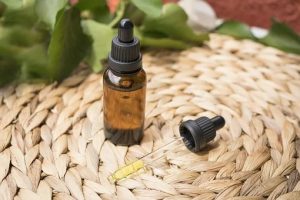Written by Angeline A. De Leon, Staff Writer. A 6-week cannabidiol intervention of 300 mg/day significantly improved Quality of Life scores in study participants with Parkinson’s disease compared to a 75 mg/day intervention or placebo.
 Neurodegenerative diseases, such as Huntington’s disease, Alzheimer’s disease, and Parkinson’s disease (PD), are incurable conditions caused by progressive loss of neuron function/structure 1. Currently, few therapies exist for neurodegenerative conditions, and extensive research efforts have identified the endocannabinoid system, critical to the maintenance of physiological homeostasis (sleep, mood, appetite, etc.), as an emergent target for pharmacotherapy. Preliminary studies from animal models suggest that cannabidiol (CBD), a primary component of Cannabis sativa, may produce neuroprotective effects that can improve symptoms of neurodegenerative disease 2,3. Among the properties that make CBD a neuroprotective agent are its anti-inflammatory effects, ability to reduce oxidative stress, and normalization of glutamate homeostasis 4. Clinical trials in human subjects, although fewer, also point to the therapeutic utility of CBD, showing evidence for CBD treatment’s ability to improve general symptoms, specific motor symptoms, and even subjective reports of emotional well-being in PD patients 5-7. Adding to this growing body of knowledge, a study published in the Journal of Psychopharmacology (2014) conducted a clinical trial examining the global effects of CBD on PD, including motor and general symptoms, quality of life, and plasma levels of brain-derived neurotrophic factor (BDNF, involved in neuronal survival and maintenance).
Neurodegenerative diseases, such as Huntington’s disease, Alzheimer’s disease, and Parkinson’s disease (PD), are incurable conditions caused by progressive loss of neuron function/structure 1. Currently, few therapies exist for neurodegenerative conditions, and extensive research efforts have identified the endocannabinoid system, critical to the maintenance of physiological homeostasis (sleep, mood, appetite, etc.), as an emergent target for pharmacotherapy. Preliminary studies from animal models suggest that cannabidiol (CBD), a primary component of Cannabis sativa, may produce neuroprotective effects that can improve symptoms of neurodegenerative disease 2,3. Among the properties that make CBD a neuroprotective agent are its anti-inflammatory effects, ability to reduce oxidative stress, and normalization of glutamate homeostasis 4. Clinical trials in human subjects, although fewer, also point to the therapeutic utility of CBD, showing evidence for CBD treatment’s ability to improve general symptoms, specific motor symptoms, and even subjective reports of emotional well-being in PD patients 5-7. Adding to this growing body of knowledge, a study published in the Journal of Psychopharmacology (2014) conducted a clinical trial examining the global effects of CBD on PD, including motor and general symptoms, quality of life, and plasma levels of brain-derived neurotrophic factor (BDNF, involved in neuronal survival and maintenance).
An exploratory, double-blind study was carried out using 21 PD patients (aged older than 45 years) who presented without dementia or comorbid psychiatric conditions and were receiving stable doses of anti-Parkinson medication for at least 30 days prior to the trial. Patients were assigned to receive 75 mg of CBD (99.9% purity), 300 mg of CBD, or a matching placebo capsule containing corn oil daily for six weeks. At baseline and following the final week of treatment, participants were assessed on motor function and symptoms of PD (Unified Parkinson’s Disease Rating Scale, UPDRS), as well as quality of life and well-being (Parkinson’s Disease Questionnaire-39, PDQ-39). Samples of blood were also collected for analysis of plasma BDNF, and subjects completed a noninvasive procedure designed to quantify biochemical compounds in the brain (proton magnetic resonance scans, H-MRS).
No statistically significant differences were detected in UPDRS scores, plasma BDNF levels, or H-MRS measures. However, for the PDQ-39, significant differences were observed between the total score of the placebo group and the 300 mg/day CBD group (p = 0.05). Scores were also statistically significantly different for placebo vs. the 300 mg/day CBD group on the “Activities of Daily Living” subscale (-0.69 +/- 6.68 vs. 21.43 +/- 13.91, p = 0.02) and for the 75 mg/day CBD group vs. 300 mg/day CBD group on the “stigma” subscale (-4.46 +/- 16.42 vs. 15.18 +/-14.37, p = 0.04) of the PDQ-39.
In line with previous findings, results indicate that significant improvement in general functioning and well-being is attainable in PD patients treated with CBD (with a dosage of at least 300 mg daily). The therapeutic efficacy of CBD as a complementary treatment for PD is promising, however, it is possible that the study period of six weeks may have been insufficient to detect changes in H-MRS and BDNF measures. Therefore, further studies on the neuroprotective effects of CBD are needed.
Source: Chagas MHN, Zuardi AW, Tumas V, et al. Effects of cannabidiol in the treatment of patients with Parkinson’s disease: an exploratory double-blind trial. J Psychopharmacol. 2014; 28(11):1088-1098. DOI: 10.1177/0269881114550355.
© The Author(s) 2014 Reprints and permissions: sagepub.co.uk/journalsPermissions.nav DOI: 10.1177/0269881114550355
Posted May 21, 2018.
References:
- Iuvone T, Esposito G, De Filippis D, Scuderi C, Steardo L. Cannabidiol: a promising drug for neurodegenerative disorders? CNS neuroscience & therapeutics. 2009;15(1):65-75.
- Zuardi AW. Cannabidiol: from an inactive cannabinoid to a drug with wide spectrum of action. Revista brasileira de psiquiatria. 2008;30(3):271-280.
- Lastres-Becker I, Molina-Holgado F, Ramos JA, Mechoulam R, Fernández-Ruiz J. Cannabinoids provide neuroprotection against 6-hydroxydopamine toxicity in vivo and in vitro: relevance to Parkinson’s disease. Neurobiology of disease. 2005;19(1-2):96-107.
- Fernández‐Ruiz J, Sagredo O, Pazos MR, et al. Cannabidiol for neurodegenerative disorders: important new clinical applications for this phytocannabinoid? British journal of clinical pharmacology. 2013;75(2):323-333.
- Zuardi AW, Crippa J, Hallak J, et al. Cannabidiol for the treatment of psychosis in Parkinson’s disease. Journal of Psychopharmacology. 2009;23(8):979-983.
- Lotan I, Treves TA, Roditi Y, Djaldetti R. Cannabis (medical marijuana) treatment for motor and non–motor symptoms of Parkinson disease: An open-label observational study. Clinical neuropharmacology. 2014;37(2):41-44.
- Venderová K, Růžička E, Voříšek V, Višňovský P. Survey on cannabis use in Parkinson’s disease: subjective improvement of motor symptoms. Movement Disorders. 2004;19(9):1102-1106.

